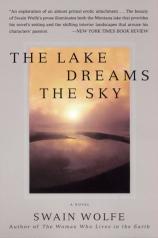Reading Group Guide
Discussion Questions
The Lake Dreams the Sky

1. . Liz returns twenty-three years later to the lake where she grew up, because she wants "some of the confidence and understanding she possessed as a child." (p.10) What does returning home mean to people? How does the experience of nature in childhood differ from what we experience as adults?
2. Throughout the novel, the theme of the relationship between primitive man and nature emerges. Ana says, "Before horses or farming, we were totally dependent on wild animals....We were compelled to speak to nature and to negotiate for more control." (p. 95) How has our lack of dependence on nature affected our lives and the way we view the world? Where does the source of our power lie now? With whom do we negotiate for control?
3. When Rose tells Cody about being raised by Indians, she describes a world that is aware, "the world was awake, everything could speak: trees and animals, grass and stones--they all spoke. Sometimes they would speak to me. And they could see me. They were thinking about me." (p. 42) How does the belief that the world is alive and aware affect our own sense of who and where we are?
4. When Liz asks Ana to define romance, the old woman responds, "Shared yearning." Do you agree? How would you describe romantic love?
5. Ana claims that primitive man approached nature with rapture and awe and that today, "Perhaps rapture and awe became unnecessary in our negotiations with animals and found another expression." (p. 96) What do you think are these alternative expressions? Does love today have the power and mystery our ancestors found in nature?
6. In considering the difference between Indians and whites, Liz says, "It's ironic that the Indians felt betrayed by their culture, because their hearts weren't hardened and we feel betrayed because ours are." (p. 185) How does this statement reflect the relationship between Native Americans and the rest of society? What kept their hearts from hardening? What has hardened ours?
7. This novel interweaves a contemporary story with one that takes place in the forties. The difference in life's pace is obvious. In the contemporary story, Ana comments, "We have good reason to feel crazy. We have the nervous system of an animal that came from a slow-moving world where all its energy came from the food it ate. Now look at us. Evolution never prepared you for this." (p. 140) Is this a definition of stress as we know it? How has access to increased sources of energy changed our lives?
8. In the novel, Katherine, the old Indian woman who raised Rose, embodies tradition and wisdom. Are we as aware of patterns and cycles now as those in the past might have been? How does wisdom differ in today's world? What place does tradition have in contemporary life?
9. Cody and Rose were ostracized in the forties because they defied society's sense of propriety. Society has made outlaws of people for many reasons, and we often view them romantically. What qualities have made people outlaws throughout history? Why are they so appealing?
10. From talking crows to flying cars, waking dreams to the monster loneliness at the bottom of the lake, magic realism infuses the pages of this novel. How does magic realism expand and reflect the novel's themes?
The Lake Dreams the Sky
- Publication Date: August 30, 2012
- Paperback: 352 pages
- Publisher: Harper Perennial
- ISBN-10: 0060929936
- ISBN-13: 9780060929930






